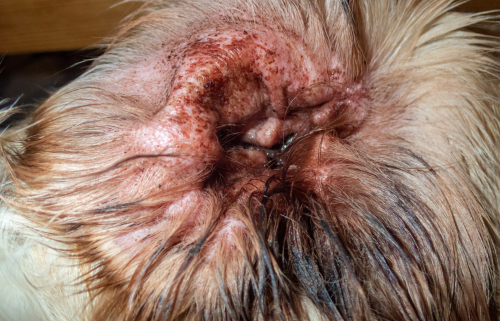Ear Infections
Ear problems are one of the top routine reasons why dogs visit the veterinarian, and many dogs suffer from painful and unpleasant ear conditions for years on end before a true long-standing cure is found. It is important to note that ear problems often go hand with allergies and sensitivities. Dogs who are prone to itchy skin and hot spots frequently suffer with ear issues as well. As with most skin conditions, a problem with the ears is often indicative of some other internal issues going on within the body. There are four causes of ear infections in dogs:
- Certain breeds with ears that hang down, like spaniels, setters, and retrievers, can be predisposed to infections and yeast buildup because these longer ear flaps provide an internal ear environment that is dark, and perfect for the growth of yeast and bacteria.
- Food (or even environmental allergies) are likely to be implicated in ear problems when both ears are involved. An excess of grain and/or sugar in the diet is one of the most common causes of ear infections in dogs. Sugar has a way of feeding the yeast which can make the infection worse.
- Dogs who regularly swim in lakes, the ocean, or swimming pools can be more prone to ear problems.
- Mites can invade the earn canal, but keep in mind that allergic ear problems can be mistaken for ear mites.
We always suggest that you speak with your veterinarian to resolve the ear infection in your pup. However, there are some natural remedies that you can try at home!
- This is helpful for acute flare-ups with sensitivity and redness.
- Often recommended for long term, stubborn skin conditions and has some success in ear infection treatment.
- This helps “push out” foreign objects from the ears.
- For animals that have a severe, malodorous discharge that causes hair loss around and under the ears, Tellurium is helpful. The ears are extremely sensitive in the Tellurium patient, and the discharge may have a fish-like smell.



